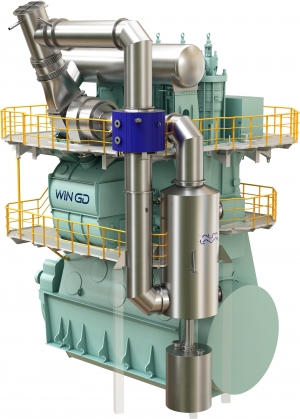


(Posted on 07/10/20)
With IMO targeting a 50% reduction in greenhouse gas emissions by 2050, LNG is becoming a natural choice for shipowners in the transition to carbon-neutral fuels. Methane slip regulations are a possibility on the horizon, but Alfa Laval and global Swiss engine developer WinGD have already cooperated on a solution. The Alfa Laval PureCool system is the main component in WinGD’s iCER technology, an option for next-generation WinGD X-DF engines that slashes methane slip and significantly boosts fuel and energy efficiency.
As a growing number of vessels turn to LNG as fuel, many shipowners are concerned about the potential appearance of methane slip regulations. LNG produces less CO2 than other fossil fuels when burned, but a small percentage of methane can slip through the engine without being combusted. Since methane has a higher global warming potential than CO2, even this small source of emissions may come into focus in meeting IMO’s ambitious climate goals.
“With IMO aiming to cut greenhouse gas emissions by at least 50% compared to 2008 levels, LNG has a major role as a bridge fuel in moving towards a carbon-neutral future,” says David Jung, Business Development Manager at Alfa Laval. “However, the awareness of methane slip and its influence on global warming is increasing. New regulations are not unthinkable, and any improvement from today’s environmental benchmark is important. With or without regulations, WinGD’s iCER technology with the Alfa Laval PureCool system will help the shipping industry align more fully with climate goals by minimizing methane slip.”
Developed by Alfa Laval in close collaboration with WinGD, PureCool is the cascade exhaust gas cooling system at the heart of the iCER concept. Short for Intelligent Control by Exhaust gas Recycling, iCER is the first development presented in X-DF2.0, WinGD’s second-generation dual-fuel engine technology.
“The iCER option is a standalone installation adjacent to the engine,” says Jung. “During operation in gas mode, it improves combustion by cooling and recirculating about 50% of the exhaust gas through a low-pressure path with full turbocharger capacity. This minimizes methane slip, and the PureCool system provides the vital cooling function that makes it possible.”
The effectiveness of iCER with PureCool is nothing short of remarkable. Trials at WinGD’s dedicated engine test facility, which were the final step in a two-year testing programme, show a methane slip reduction of up to 50%.
“This is not fine-tuning or a marginal improvement of LNG technology,” says Jung. “This is a major environmental gain that truly strengthens LNG’s profile. With the PureCool system at its heart, iCER will cut methane slip by as much as half.”
Beyond the methane slip reduction, the iCER solution with PureCool offers engine buyers significant operational benefits – thus creating value even prior to potential compliance regulations. When combustion is improved with iCER, fuel consumption in gas mode is reduced by 3%.
“The PureCool system improves a vessel’s efficiency along with its emissions,” says Jung. “The fuel savings inherent to iCER can have a positive impact on a vessel’s Energy Efficiency Design Index.”
As iCER moves into the commercial phase and prepares for a first pilot installation, Jung is proud to see the PureCool system enter Alfa Laval’s compliance portfolio. It joins successful solutions for a wide range of environmental challenges, but it is the first such solution related to non-traditional fuel.
Leading vessel performance platform Smart Ship Hub says the industry should expect a breakthrough year... Read more
The Nordic countries are taking an important step towards decarbonising maritime transport with the... Read more
Germany’s Steelpaint has appointed ADD Marine as its representative for Greece and Cyprus, strengthening... Read more
Rio Tinto’s first Pilbara-made iron ore rail car has rolled off the production line in Karratha... Read more
Precision meets progress at Phu My Port, Vietnam. The LPS 550 has been deployed to handle bulk commodities... Read more
bound4blue, a global leader in wind propulsion systems, has expanded its industrial footprint in Asia... Read more
As the industry explores multiple decarbonisation pathways, methanol is gaining attention as a practical... Read more
Technology group Wärtsilä will supply an integrated hybrid propulsion system for a bulk carrier... Read more
Superior Industries, Inc., a US-based manufacturer and global supplier of bulk material processing and... Read more
ESL Shipping has taken a significant step forward in digitalisation by deploying a new multichannel... Read more